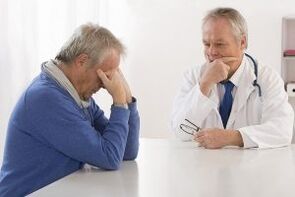According to statistics, about a third of men after the age of thirty suffer from prostatitis, and almost half after the age of fifty.

Perhaps the real situation is a bit different, because there is an asymptomatic prostatitis (chronic form). Another problem is that many people are just shy or afraid to report their symptoms to a doctor.
The prostate gland is a very important organ of the male body: it is responsible for the production of a special secretion that mixes with sperm and maintains normal and healthy sperm activity, as well as the resistance of sperm to adverse facts and conditions.
Symptoms of prostatitis in men
What are the symptoms of prostatitis in men? Symptoms of prostatitis in men:
- Potential problems.
- Development of neurological diseases.
- Malaise.
- Pain in the perineum, groin and groin area is short-lived and passes quickly.
- White flake-like discharge from the urethra (mostly in the morning).
Below you will find information about the symptoms of prostatitis in men.
More about each
How does prostatitis manifest in men? In men, the first sign of prostatitis is frequent urination.
The urge to urinate increases day and night. The process of urination is accompanied by painful sensations in the lower abdomen ("as if cutting"). The painful sensation can become chronic and manifest itself only during urination. Frequent urination with painful sensations often indicates chronic prostatitis.
Manifestations of prostatitis in men include a constant feeling of fullness of the bladder.
After the action, the bladder still feels full. Nervousness and self-doubt increase. It can occur in both forms of disease development. Medical attention is needed because the excessive development of this symptom is urinary retention in prostatitis.

Blood in the urine with prostatitis is a rare symptom. May show:
- development of purulent and inflammatory processes; for trauma
- ; For complicated prostatitis - hyperplasia (a separate disease characterized by an increase in the number of structural elements in the tissue, excessive cell formation).
Increased fatigue is the result of illness. First, in the absence of treatment, the body alone compensates for the disease, which is reflected in the mental resources.
Irritability and fatigue, as well as an increase in depressive states are possible.
Develops more in chronic form.
Pain in the perineum and scrotum.
Increases if left untreated. It develops in both chronic and acute forms.
Sexual dysfunction. Erection worsens and "decreases", the duration of sexual intercourse is significantly reduced. Spontaneous morning erection also disappears. It is an indirect sign, showing a more chronic form.
Difficulty with bowel movements - painful sensations in the rectum, bowel movements during bowel movements are possible. Talks about a sharp form.
Excessive sweating indicates a chronic form of the disease. Sweating is often seen in the perineal region. It can go "together" with emotional disorders (as a result of anxiety and psychogenic factors).
Constipation with prostatitis is also a symptom. How to recognize prostatitis? If you find similar symptoms, it is better to contact a specialist who will make a correct diagnosis.
Consider the symptoms of acute and chronic prostatitis and prostatitis in men.
Acute form
How prostatitis manifests itself in men - symptoms:
- General weakness and severe weakness.
- Body temperature is one of the symptoms of prostatitis, followed by headache.
- Symptoms of increased prostatitis pain with urinary and bowel movements (in the perineum).
- Often the desire to go to the toilet does not bring satisfaction - the bladder is not completely emptied.
- This in turn increases irritability and nervous irritability. In clinical cases, the development of acute urinary retention is possible.
Chronic form
The course is, as a rule, asymptomatic, the person practically does not complain (or may be unaware of them).

Symptoms of the disease are almost non-existent.
If you do not understand the manifestations and symptoms of prostatitis, it is considered "embarrassing", despite the spread of the disease.
A common concern is that a person who has a problem with urination may simply "ignore" these symptoms and not pay enough attention to them.
PSA levels may be elevated in chronic prostatitis, but not always. There are many cases in which men with chronic prostatitis have normal PSA levels. Chronic prostatitis is often undetectable.
In the early stages, prostatitis in men manifests itself as an acute inflammatory form of the prostate gland, ie the development of inflammation after bacteria enter the prostate gland through certain channels, such as the urethra.
Given that chronic prostatitis is a fairly slow disease, the immune system resists the process of acute inflammation.
As the inflammation does not completely heal, there is a persistent inflammatory process in the prostate gland, which becomes chronic and can lead to ulceration of the prostate gland at the site of inflammation.
Larger scars can cause prostate dysfunction. As with acute prostatitis, chronic prostatitis can be diagnosed with the following symptoms:
Symptoms of prostatitis in men (chronic form):
- Compression and pain in the perineum and genitals.
- Painful ejaculation.
- Pain in the bladder.
- Pain and burning during or after urination.
- Pain and soreness in the groin area.
- Increased urination.
- Erectile dysfunction.
Clinical presentation and development
Symptoms of prostatitis in men indicate the need to see a doctor immediately. Which doctor should I see for prostatitis? Read more here.
The inflammatory process leads to narrowing of the lumen of the urethra and irritation of the nerve endings, which is characterized by a violation of the process of urination (as you know, it happens several times a night, urination is carried out in "small parts", a feeling of satisfactionno. the bladder is completely empty).
Inflammation of the prostate gland, if started on time, does not cause disorders of the genitals. If the inflammatory process is sufficiently developed: if libido is inhibited, infertility may develop, the risk of secondary urinary tract infection increases, and chronic renal failure may develop.
What else can manifestations say?
Impaired sexual function as a separate symptom or in combination with sweating can be a symptom of a nervous disorder. For example, chronic stress.

Some of our diseases are nervous.
Sexual dysfunction, meanwhile, often has a nervous underpinning and is caused by the psyche.
In this case, as a rule, the consultation of more than one psychologist or psychotherapist is required.
It is important to know: if we are talking about sexual dysfunction on a nervous basis, we must take into account that in this case there will be no inflammation and fever, and no discharge will be observed.
Diagnosis should begin with a doctor. Of course, when sexual dysfunction is the only symptom, you should start with a walk to a psychologist (and you may be advised to continue the necessary tests and consult a doctor).
An unambiguous diagnosis can be made only after examination by a doctor and the necessary tests. Above all, the presence of discharge or inflammation speaks of sexually transmitted diseases.
All these diseases can be distinguished only by the results of clinical blood tests, spots. And each disease can have its own drug treatment program (for example, a course of antibiotics).
Who should I contact?
How to check for prostatitis? The examination should begin with a urologist and andrologist.
It is advisable to consult a physiotherapist, physiotherapist and psychologist to normalize the patient's mental state during recovery activities (after the main treatment).
You should listen carefully to the advice of a specialist, and if treatment is prescribed, follow it strictly. Do not forget the preventive measures that will be appropriate after the end of treatment.
Result
Now you know what are the symptoms of prostatitis in men. It is recommended to avoid hypothermia, try not to eat spicy and fried foods, alcohol and smoking, and to have a regular sex life. Remember to prevent sexually transmitted diseases (you must be protected first).
Follow your doctor's advice. Even if you do not have a healthy lifestyle, at least try not to abuse harmful substances (cigarettes, alcohol) to avoid harm. Do not hesitate to report your complaints to your doctor. If your loved one is sick, give emotional support.






























